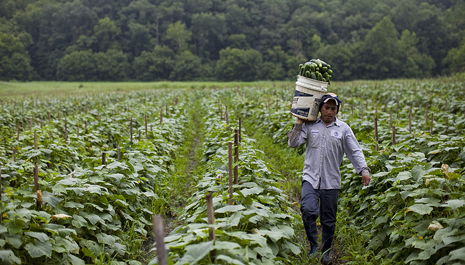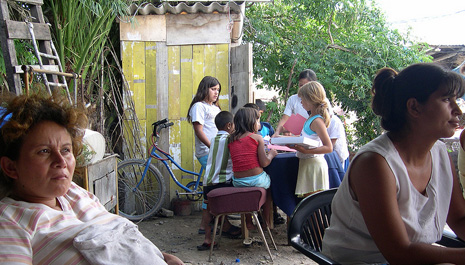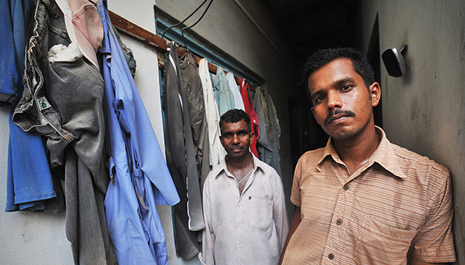Governance of Migration
(Research papers and policy briefs below)
There is indeed a comprehensive international legal framework for governance of migration despite academic literature and political discourse to the contrary. It is essentially designed to support good governance, regulation, and effective administration at national and local levels, where most migration issues and responsibilities are concentrated. The international governance framework comprises mandates and responsibilities in a range of international and regional agencies and organizations. The framework includes globally applicable policy recommendations elaborated in formal, authoritative international conferences over the last three decades.Identifying appropriate and workable approaches to governance of 'natural,' permanent and worldwide migratory phenomena is urgent. The rule of law and legal mechanisms are recognized foundations for guaranteeing protection of migrants, obtaining democratic governance of nation-States, and for regulating relations among nations. Indeed, a comprehensive framework of international standards, institutions, stakeholder consultative forums and administrative mechanisms to protect migrants and regulate migration was carefully constructed over the last century.
The legal framework is provided by complementary legal standards in several areas of international law (See International Standards)
The international institutional structure mirrors the multitude of concerns in governing large populations, whether within a particular state or spread across many. A number of specialized UN and other international institutions address relevant aspects of migration in their mandates, competencies and activity. These include the international agencies addressing labour and employment, health, security, development, education, human rights, criminal justice, etc. No single agency could possibly address with necessary competence the range of concerns of governing populations, each requiring specialized knowledge, law, technical approaches, and functions, in the same way that no national government could do away with distinct ministries – often 20 or more– covering specific areas of governance to instead function with a sole super-ministry.
Today, need for normative and policy guidance is evident in almost every country, and internationally. Globalized economic, social, political and demographic factors are increasing dependency of countries worldwide on foreign skills and labour, while absence of decent work, repressive conditions and environmental factors displace millions, making human mobility a predominant feature of contemporary globalization. Widespread abuse and exploitation of migrants undermine decent work and social welfare in many situations. Rising discrimination and xenophobia pose as yet unchecked threats to social cohesion. News media and public discourse paint migration as threatening security, society and the very identity of nations.
These features pose new challenges for national and local governments, for social partners and for civil society. However, in a contemporary environment of deregulation, existing rules, mechanisms and dialogue spaces for national governance and international cooperation are often overlooked or overruled. Dialogue abounds but little discussion is anchored in clear understandings of what governance means and what governance instruments apply to migration. Nor is much debate grounded in adequate, evidence-based assessments of existing conditions and historical experience and acquis.
Building on solid normative standards and worldwide experience, GMPA is engaged in review of established principles, policy frameworks, institutional setups and practical measures to reconsider their relevance to future as well as present conditions.
GMPA is also focusing on regulation and governance of population (labour and skills) mobility in multi-State economic integration, common market and "free movement" areas. Today, more than 110 countries are part of one or more multi-country regional integration initiatives where freer circulation of people is formally established or is being negotiated. Another GMPA concern is to provide guidance and support for local authorities worldwide who have vital administrative roles and responsibilities in cities, districts, departments and regions with increasingly diverse and immigrant populations.
Documents and Papers
- Just published! Technical Capacity-building Manual. Admission and Post-Admission Labour Migration Policies and Tools: Guidance for main Countries of Destination in Southern Africa and the Indian Ocean region. International Labour Office, ILO, Pretoria, 2024. (184 pages) Prepared by Global Migration Policy Associates (GMPA) expert team: Piyasiri Wickramasekara, Chandima Arambepola, Patrick Taran and Olga Kadysheva.
- Ratifications of conventions on migration goverance / migrants rights (ILO C-97 & C-143, ICRMW), updated 26 November 2023
- Cote d'Ivoire became 59th State Party to the 1990 International Convention on the Protection of the Rights of All Migrant Workers and Members of Their Families, acceding to the ICRMW on 26 September 2023.
- The Congo (Brazzaville) ratified both ILO Conventions C-97 and C-143 on migration for employment/migrant workers, on 26 October, becoming one of several 'champion countries' to have ratified all 3 migration governance/migrants rights conventions.
- Nigeria ratifies ILO Convention 143 on migrant workers & C-181 on private employment agencies; GMPA contribution. (6 May 2023)
- It’s all about content P.Taran, 5th EUROMED Migration communicators conf. Nov.2022
- KESK Symposium Global migration context & union agenda P.Taran, Sept.2022.
- The Global and African Legal Normative Frameworks and Policy Guidance on protection of migrants and migration governance, Resource Briefing Paper, P.Taran, Aug.2022
- Rapporteur Summary, Global Parliamentary Conference on refugees and migration, Istanbul, June 2022
- Migration, Human Rights & Sustainable Economies: A Century 21 Agenda. P. Taran, 2022, Revista Tecnológica - Espol.
- La Pandemia de Covid y Los Migrantes: una Agenda de Diez Puntos Para Mitigar el Desastre en Curso. P. Taran & N. Solorzano Alcivar (2021).
- Migration-Health-HIV&AIDS Framework for Action Brief 2019
- Core elements of a bilateral agreement or a memorandum of understanding on labour migration. P.Wickramasekara, ILO, 2018.
- Good Practices and Provisions in Multilateral and Bilateral Labour Agreements and Memoranda of Understanding. P.Wickramasekara, ILO, 2018.
- Migration, Development, Integration & Human Rights: Global Challenges in the 21st Century. Taran, 2018.
- The primacy of city/local governance on migration: challenges and ways forward. P.Taran and O.Kadysheva, 2018.
- Migrant Women, Women Migrant Workers. Crucial challenges for advocacy, services and action. Taran, 2018.
- Promoting a Rights-based Approach to Migration, Health, and HIV and AIDS: A Framework for Action. ILO, 2017. Researched and written by P.Taran with GMPA team.
- GCM Thematic Consultation Statement July 2017
- GCM Thematic Consultation Statement May 2017
- Governance of Migration Context Note June 2017
- Cities welcoming refugees and migrants: enhancing effective urban governance in an age of migration. UNESCO-ECCAR-GMPA, 2016.
- Migrants and Refugees Have Rights: Impact of EU Policies on Accessing Protection Caritas Europa, 2015, researched and written by GMPA team
- Handbook for Parliamentarians: Migration, Human Rights and Governance. IPU-ILO-OHCHR, 2015
- Rapporteur Summary, 2nd Global Consultation, Colombo
- GMPA Views on Proposed Targets for the post-2015 Development Agenda Regarding International Migration, GMPA, 2014.
- A Contribution to Evaluating the Stockholm Programme Regarding Migration, TARAN, 2014.
- International Migration, Human Rights, Development & Governance: Current State of Affairs: A Global Overview, TARAN, 2014.
- Migration: Economic & Social Impact, TARAN, 2013.
- Restructuring EU-MENA Relations in the Wake of Arab Revolts: A Critical Perspective from the South, FAKHOURY, 2012.
- The Role of Academia in Informing Policies in Light of the Arab Uprisings, FAKHOURY, 2012.
- Labour inspection and migrant workers: Special challenges in an age of globalization and deregulation. P.Taran, 2012.
- Are the Historical Lessons of the Tsarist and Totalitarian Migration Policy Worth Learning or Sinking into Obscurity? IVAKHNYUK, 2011.
- Kazakh Parliamentary Workshop: Labour Migration, Governance and the Rule of Law, TARAN, 2011.
- Migration in MENA Countries: challenges of 'Arab Spring' Upheavals in Context of Globalized Migration, TARAN, 2011.
- Role of Migration in Post-Revolution Tunisia: Mobility, Development and Governance, TARAN, 2011.
- The Future of Migration Has Arrived: Regulation and Governance: What's at Stake for Administration, TARAN, 2011.
- Labour Market Performance and Migration Flows in Arab Mediterranean Countries: Determinants and Effects, Volume 1, FAKHOURY, VENTURINI & JOUANT, 2010.
- Migration, Governance and Human Rights: Contemporary Dilemmas in Era of Globalization, TARAN & CHOLEWINSKI, 2010.
- La Directiva de Retorno de la UE: Apuntes Críticos Desde una Perspectiva de Derechos Humanos, CERIANI, 2009.
- European Migration Control in the African Territory: the Omission of the Extraterritorial Character of Human Rights Obligations, CERIANI, 2009.
- Migration and Deportation in West Africa, Chapter 3: Migrant Rights and Migration Control Policies in the Jurisprudence of the European Court of Human Rights: Challenges, Obstacles and Opportunities for Litigation, CERIANI, 2008.
- Imperatives for Union Leadership in Defending a Rights Based Approach to Migration in the Age of Globalization, TARAN, 2006.
- Regulating Migration: A Key to Russia's Future: A Contribution to the Hearing on Irregular Migration and Security, TARAN, 2006.
- House of Lords Hearing Economic Migration to the EU, TARAN, 2005.





